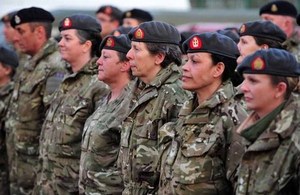Healthcare reservists in the armed forces
Plans to expand the number of NHS staff who train as reservists for the armed forces have been explored in a major reservist summit.

Army reservists of 208 Field Hospital on parade following a 3-month tour of Afghanistan (library image) [Picture: Mark Owens, Crown copyright]
Leaders and representatives from key organisations across the health system met on Tuesday, 25 March, to discuss plans to significantly expand programmes of engagement between the Ministry of Defence (MOD) and NHS organisations.
In a wide-ranging debate, the benefits to healthcare, individuals and national defence were highlighted. Staff who become reservists undergo fitness checks and receive world class training that significantly improves their capability in either workplace.
At the summit, organisations committed to support the objectives of last year’s MOD ‘Reserves in the Future Force 2020: Valuable and Valued’ paper, which stated that by 2020 volunteer reservists in the UK will need to make up around 29% of the nation’s defence capacity. Currently over 2,000 NHS staff are trained and registered reservists.
Minister for Defence Personnel, Welfare and Veterans, Anna Soubry, said:
I am delighted to have attended this summit, which has proved very useful in exploring future opportunities for NHS staff to join the reserves.
The NHS has long played an invaluable role providing reservists to our armed forces and we are committed to utilising the skills that every healthcare professional brings. Reserve service makes for a healthier armed forces and a stronger NHS; it is to our mutual benefit.